Gender Equality National Report Hungary - European-microfinance ...
Gender Equality National Report Hungary - European-microfinance ...
Gender Equality National Report Hungary - European-microfinance ...
You also want an ePaper? Increase the reach of your titles
YUMPU automatically turns print PDFs into web optimized ePapers that Google loves.
4. Conclusions and recommendations<br />
4.1. Conclusions<br />
Entrepreneurship culture practically needs to be recreated in <strong>Hungary</strong>; its quality needs to be<br />
significantly improved and this requires a lot more effort. The main reason for this is that<br />
during the Soviet occupation, traditional small private enterprises were not allowed to operate<br />
for duration of about 40 years. The majority of businesses were established during and after<br />
the transition years, however entrepreneurs lacked an entrepreneurial past and experience.<br />
Entrepreneurs could not get the necessary knowledge from their parents, or in the school<br />
system. Sadly, basic financial-entrepreneurial topics are still not included in the elementary<br />
school curriculum, and even high schools and colleges/universities teach these mostly only<br />
at business, finance and technology faculties.<br />
The fact that the population of the country did not have notable entrepreneurial traditions,<br />
experience or knowledge nor the necessary accumulated capital, significantly hindered the<br />
development and efficient operation (or simply the survival) of the enterprises.<br />
Even today the notable under-capitalization and lack of resources of micro- and small<br />
enterprises remains a problem.<br />
The existing entrepreneurial group in <strong>Hungary</strong> does not have a multi-generation<br />
entrepreneurial past, which could have enabled capital accumulation.<br />
The official SME development strategy approved by the government has been implemented<br />
for some time now and it gets renewed from time to time (the latest such renewal was in<br />
February 2007). However, it is usually accompanied by vivid professional debate because it<br />
is not based on a wide professional consensus.<br />
In their rhetoric, all governments so far have emphasized the support of the SME sector and<br />
the improvement of financial terms; however it has not entirely been realized in practice or at<br />
the required professional standards.<br />
Sometimes there are some very innovative initiatives independent from government.<br />
Frequently one gets the feeling that they fail to sufficiently appreciate the indirect ways of<br />
supporting enterprises and the significance of the mediating and service providing institution.<br />
The professional state apparatus responsible for enterprise promotion has not always taken<br />
sufficient care of the SME promotion programs; it does not sufficiently appreciate the indirect<br />
ways of enterprise promotion or the importance of the relaying service providing institutions.<br />
Recently the government recognized that the administrative and financial burdens of starting,<br />
running and ceasing a business have been high; thus a radical restructuring program has<br />
been launched. This must be implemented consistently.<br />
Although the institution of enterprise development was established a long time ago, it does<br />
not seem to operate efficiently. The aim is now to improve the efficiency of the existing<br />
institutions and to enhance the specialization and professionalism of the organizations.<br />
The main task is to eliminate the shortcomings of the professional preparation, control and<br />
finance of the programs as well as the parallelisms.<br />
In order to promote micro-enterprises, a service providing network has been created on the<br />
initiative and from the funds of the EU PHARE program, but the expertise and capacity of this<br />
network were not sufficiently utilized by the governments. The results confirmed and signified<br />
the necessity of the “bridging” relaying function of the LEAs though.<br />
64



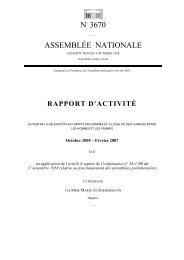


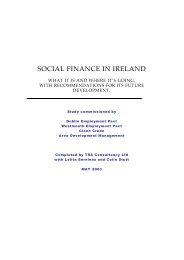

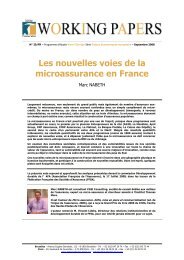



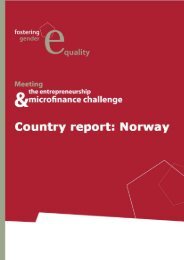
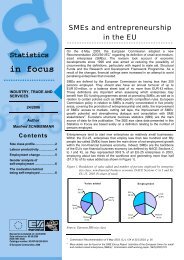
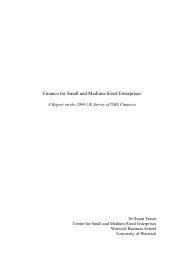
![Joint Report on Social Protection and Social Inclusion [2005]](https://img.yumpu.com/19580638/1/190x132/joint-report-on-social-protection-and-social-inclusion-2005.jpg?quality=85)
